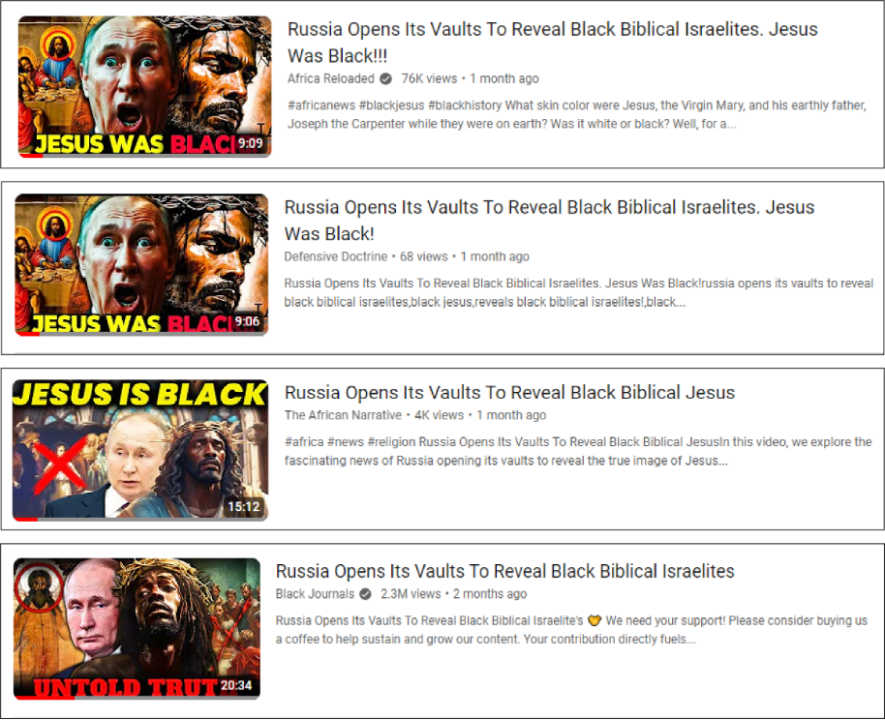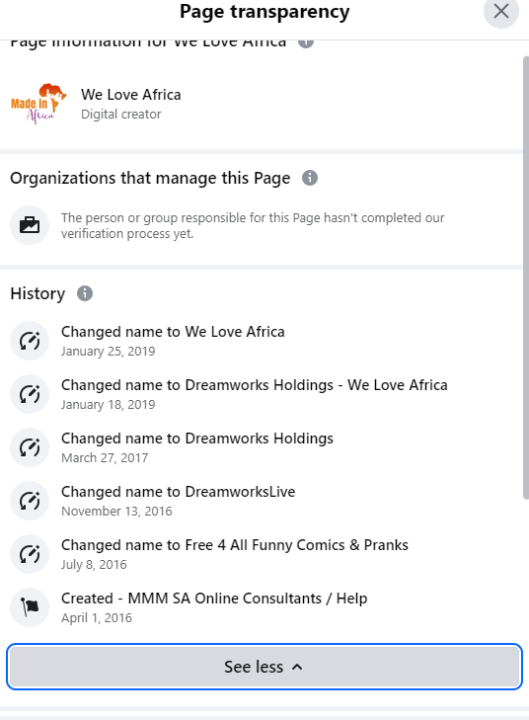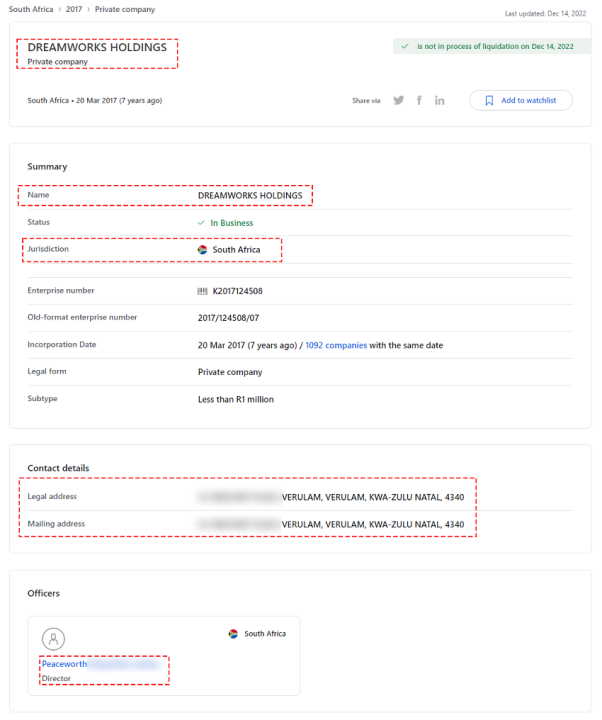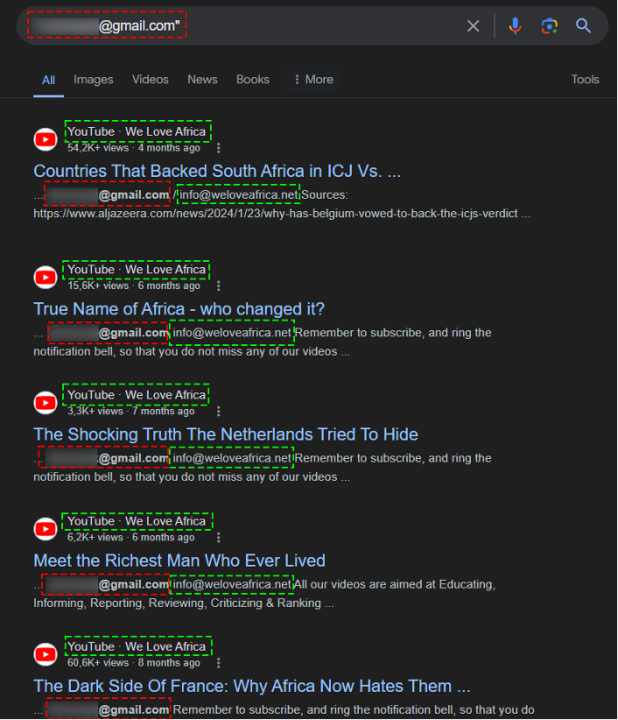Fringe YouTube channels promote pro-Kremlin narratives in Africa
Channels attracted millions of views and hundreds of thousands of subscribers by using anti-Western content directed at African audiences

Banner: Screencap of YouTube video targeting French President Emmanuel Macron. (Source: @officialtrmedia)
The DFRLab analyzed twenty suspicious YouTube channels acting in a highly similar fashion, mimicking pro-Kremlin and anti-Western news content in videos targeting African audiences in several countries. The channels used comparable tactics, including possible AI-generated voice narrations, related titles and thumbnails, and publicly available footage.
The channels published content targeting Burkina Faso, Niger, Senegal, Mali, Rwanda, and Congo. Their videos covered real news events but presented them in a misleading way with clickbait titles that further sensationalized the content. Notably, one of the channels was cited by a media outlet and in an academic study, highlighting the breakout ability of such content to reach different audiences outside of YouTube.
Additional suspicious posts on X appear to indicate that the YouTube channels’ best performing content denigrated French politicians following the Niger crisis, along with videos in favor of South Africa’s case at the International Court of Justice (ICJ) accusing Israel of alleged genocidal acts against Palestinians. Certain posts also shared videos with pro-Russian views on the presence of Wagner soldiers in West Africa that criticized the role of the Economic Community of West African States (ECOWAS).
The DFRLab was able to attribute two of the twenty analyzed channels to individuals and companies based in South Africa and Cameroon.
The channels appear to be similar in their style and tactics to several French-language channels identified by Le Monde in January 2024. Some of the channels were first highlighted by the Information Epidemiology Lab.
Channels push false and misleading content
In addition to misleading audiences about real-time news and events through exaggerated and sensationalist content, some YouTube channels also published videos containing false information to promote Russian interests.
For example, some of the channels amplified a false claim that Putin had revealed a long-suppressed secret by the West proving that Jesus was Black. In another example, several channels falsely claimed that Africans can now travel to Russia without a visa.

Many channels described themselves as platforms focused on showcasing African content and news as well as educating viewers about African culture and history. Combined, these channels garnered over 400 million views, with most of them individually amassing millions of views and hundreds of thousands of subscribers.
Suspiciously similar content
Channel content exhibited multiple similarities to each other, including similar titles, thumbnails, narrated scripts, video descriptions, and the same publicly available footage. For example, four different channels published videos with similar titles about the expulsion of three French diplomats by Burkina Faso’s military. One of the channels, the New Tourist, also used similar unrelated narration from an older video published by the same channel in December 2023.

In a more direct example, two videos by the channels Defensive Doctrine and TR Media misleadingly used pledges by Senegalese President Bassirou Diomaye Faye to renegotiate current oil and gas contracts to claim that he will ban oil exports to France. The two videos, published on April 30 and May 1, 2024, used the exact same thumbnails and titles while their content also included very similar narrations and footage. These videos, in turn, were similar to a video previously published by The New Tourist on April 26, 2024, which also utilized the same visual content.

In another example, four videos by the channels Africa Infohub, The African Affairs, The African Narrative, and Displore defending the presence of Wagner group in Africa utilized nearly identical sentences in their narration. Three of the four videos stated in their introductions that Western media portray Wagner group “as a modern form of colonial power,” while the fourth described Wagner “as a contemporary colonial force.” Similar examples were found in video titles, including videos from The New Tourist and Africa Infohub titled “The 5 Countries That Want To Back Niger Against France & ECOWAS Forces.”

Another suspicious sign was found in the About sections of the channels The New Tourist and Africa Reloaded. Both channels had nearly identical descriptions, with The New Tourist differing by adding a welcome message at the start of the description and the words “Stay blessed” at the end.

Expanding reach through cross-promotion
Many channels also utilized YouTube Community posts to cross-promote each other’s videos. Community posts allow creators to share different types of posts, including video links. Channels such as The African Narrative, The New Tourist, TR Media, and Africa Reloaded regularly published community posts promoting videos of each other’s channels.

Some of the channels were motivated by profit, incorporating advertising, donation opportunities, and in one case, affiliate links. For instance, the channels African Buzz and We Love Africa both added the online platform Buy Me Coffee to receive donations from fans in their about pages and videos descriptions. We Love Africa also provided viewers with a PayPal donation link. According to VidIQ, which provides estimated monthly earnings for YouTube channels, channels such as Africa is Powerful and Black Culture Diary could earn between $100 to $300 per video. It is important to note, though, that VidIQ provides earnings estimates which can vary depending on audience demographics and ad engagement.
South Africa links
The channel We Love Africa appears to be hosted by a company named Dreamworks Holdings, based in South Africa’s KwaZulu-Natal state, according to information publicly available on Facebook, WHOIS, and open-source business records.
The transparency section of the channel’s Facebook page indicates that it was initially named “Dreamworks Holdings” in 2017. It then changed to “Dreamworks Holdings – We love Africa” before dropping the first part of the name in January 2019.

Meanwhile, We Love Africa’s YouTube channel and Facebook page appear to both be linked to the domain weloveafrica.net. DNS Analytics historic records show that the now-defunct website previously shared a Google AdSense code with the website dreamworksnews.com.

The WHOIS records of both dreamworksnews.com and weloveafrica.net indicate that the registrant was based in KwaZulu-Natal, abbreviated KZN. The dreamworksnews.com historical WHOIS records also indicate a full address in the KZN city of Verulam, as well as the name of the domain registrant.
Using open-source business portal B2bint, the DFRLab was able to connect the dreamworksnews.com WHOIS records to the company Dreamworks Holdings based at the same address and owned by the same person as mentioned in the WHOIS records. In addition, the email address specified in the dreamworksnews.com WHOIS records also appear in the descriptions of various videos of the We Love Africa YouTube channel.


A Cameroonian marketing agency
The YouTube channel TR Media also appears to be connected to the Cameroonian SEO and IT company THINKRICH Media Agency, also known as TR Media. In addition, evidence suggests that the channel The New Tourist is administered by individuals working in company LooxMedia, which is also linked web forensics to TR Media.
On various video descriptions, the channel Think Rich Africa includes a link to content creators’ support platform Buy Me A Coffee. On this page, the creator is named TR Media, as an abbreviation for Think Rich Media Agency. The DFRLab found a Facebook page that appears to belong to the agency. In addition, the email address featured on the Facebook page is also referenced in TR Media’s video descriptions.


On LinkedIn, a THINKRICH Media Agency page also references the domain thinkrichmedia.com, which also appears on Thinkrich media agency’s Facebook page. As with the information showed on the transparency section of the Facebook page, the agency claims to be based out of the city of Douala, Cameroon.

Some channels also had accounts on TikTok, where they posted similar content tailored for the platform and sometimes shared the same videos from YouTube. Despite TikTok accounts having fewer followers than YouTube, the account Africa is Powerful garnered more than 500,000 followers and around four million likes. The TikTok account of Africa Reloaded also gained more than 60,000 followers and received over 400,000 likes.
This piece was written in collaboration with other members of the DFRLab team.
Cite this case study:
Valentin Châtelet et al, “Fringe YouTube channels promote pro-Kremlin narratives in Africa,” Digital Forensic Research Lab (DFRLab), July 29, 2024, https://dfrlab.org/2024/07/29/fringe-channels-africa/.

